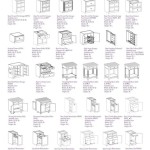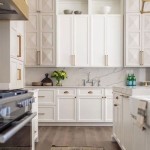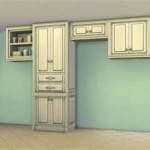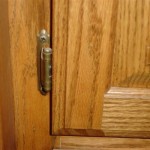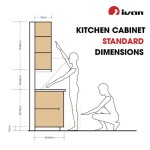Concrete Kitchen Cabinets: A Modern and Durable Choice
In the realm of kitchen design, where functionality meets aesthetics, concrete kitchen cabinets emerge as a bold and contemporary choice. These cabinets, crafted from a material known for its strength and versatility, are gaining popularity among homeowners seeking a unique and enduring solution. This article delves into the world of concrete kitchen cabinets, exploring their advantages, considerations, and how they can transform the heart of your home.
Advantages of Concrete Kitchen Cabinets
Concrete kitchen cabinets offer a compelling array of benefits that set them apart from traditional cabinet materials. The inherent qualities of concrete translate into a range of advantages for homeowners:
- Exceptional Durability: Concrete is renowned for its exceptional strength and resistance to wear and tear. Concrete cabinets can withstand the rigors of daily kitchen use, resisting scratches, dents, and impacts, ensuring longevity and minimizing maintenance needs.
- Fire Resistance: Concrete is inherently fire-resistant, providing an added layer of safety in the kitchen environment. This attribute is particularly valuable in high-traffic areas where potential fire hazards may exist.
- Moisture Resistance: Concrete is impervious to moisture, making it an ideal material for humid kitchen environments. It resists warping, rotting, and mold growth, ensuring a long-lasting and hygienic cabinet system.
- Unique Aesthetics: Concrete offers a unique aesthetic that is both modern and industrial. Its raw, textured surface adds a touch of sophistication and character to any kitchen design. The natural variations in concrete create a one-of-a-kind look that is impossible to replicate with other materials.
- Customization: Concrete is highly customizable in terms of color, finish, and design. It can be stained, painted, or sealed to achieve a desired look. Options range from sleek and minimalist to bold and textured, allowing homeowners to personalize their kitchen cabinets to their taste.
Considerations for Concrete Kitchen Cabinets
While offering a host of advantages, concrete kitchen cabinets also present some considerations that homeowners should be aware of before making a decision:
- Weight: Concrete is a heavier material than wood, requiring specialized installation techniques and structural considerations. It is essential to consult with a qualified contractor who has experience working with concrete cabinets.
- Cost: Concrete cabinets tend to be more expensive than traditional wood cabinets, due to the specialized fabrication and installation processes involved. However, their durability and long lifespan can offset the higher initial investment over time.
- Porosity: Concrete is a porous material, which means it can absorb liquids. Proper sealing is crucial to prevent stains and damage. Regular maintenance and sealing are essential to maintain the integrity and aesthetics of concrete cabinets.
- Limited Styles: While concrete offers customization options, the material's inherent properties may limit certain design elements. Complex shapes or intricate carvings may be difficult to achieve with concrete.
Integrating Concrete Kitchen Cabinets into Your Design
Concrete kitchen cabinets can seamlessly integrate into a variety of kitchen design styles, from contemporary and industrial to farmhouse and modern farmhouse. Here are some tips for incorporating concrete cabinets into your kitchen:
- Embrace Contrast: Concrete's cool, industrial aesthetic pairs well with warm wood accents, creating a balance of textures and temperatures. Consider incorporating wooden countertops, backsplashes, or open shelving to complement the concrete cabinets.
- Play with Lighting: Concrete's textured surface can enhance the play of light and shadow in the kitchen. Strategic lighting can accentuate the unique beauty of the cabinets and create a warm and inviting atmosphere.
- Choose Complementary Hardware: Opt for cabinet hardware that complements the concrete's modern aesthetic. Sleek, minimalist handles or knobs in metallic finishes such as brushed nickel or black matte can enhance the overall design.
- Incorporate Other Industrial Elements: To amplify the industrial vibe, consider incorporating other elements such as exposed brick walls, metal accents, or vintage light fixtures. These elements will create a cohesive and stylish kitchen design.
In conclusion, concrete kitchen cabinets offer a unique blend of durability, aesthetics, and customization, making them a compelling choice for homeowners seeking a distinctive and long-lasting kitchen design. By carefully considering the advantages, considerations, and design tips outlined above, homeowners can create a kitchen that is both functional and visually stunning, showcasing the enduring beauty of concrete.

Will Concrete Cabinetry Bring More Strength To The Kitchen

Kitchen Counters Concrete The Ly Indestructible Option

120 Best Concrete Kitchen Ideas Design Countertops

Will Concrete Cabinetry Bring More Strength To The Kitchen

Kitchen Concrete Counters Design Photos And Ideas Dwell

57 Concrete Kitchen Countertop Ideas Digsdigs

My Paradissi Concrete Kitchen Rustic Cabinets

Kitchen Concrete Counters Design Photos And Ideas Dwell

Free On 72 Japandi Concrete Gray Wooden Kitchen Lsland Storage Cabinet With Light Homary In 2024

Spanish Kitchens
Related Posts

